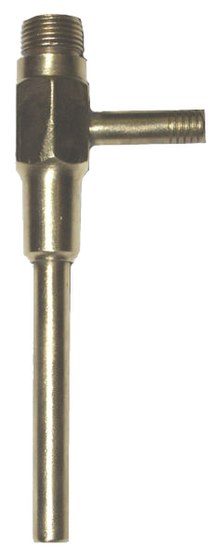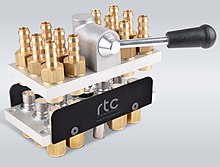
 A copper aspirator. The water inlet and outlet are at the top and bottom, respectively; the air inlet is on the side. A copper aspirator. The water inlet and outlet are at the top and bottom, respectively; the air inlet is on the side. |

Hose barbs are cylindrical pieces or parts for attaching and securing of hoses (tubing). The barb-like rings on the cylindrical piece allow for an easy push-connection of flexible-plastic or rubber tubing that is not so easily disconnected. Hose barbs are used in machine perfusion and chemistry laboratory equipment. Hose barb fittings are small curved, bent or T-shaped pipes, hoses or tubes with hose barbs on at least one side used to join two or more pieces of piping (hosing, tubing) together. Hose barbs are commonly used in the agriculture industry to connect anhydrous ammonia (NH3) hoses.
See also
References
- "An Introduction to Hose Barbed Fittings" (PDF). Brookhaven National Laboratory. Colder Products Company.
- "NH3 (Anhydrous Ammonia) Hose Barbs". Continental NH3.
External links
This article related to medical equipment is a stub. You can help Misplaced Pages by expanding it. |
This chemistry-related article is a stub. You can help Misplaced Pages by expanding it. |